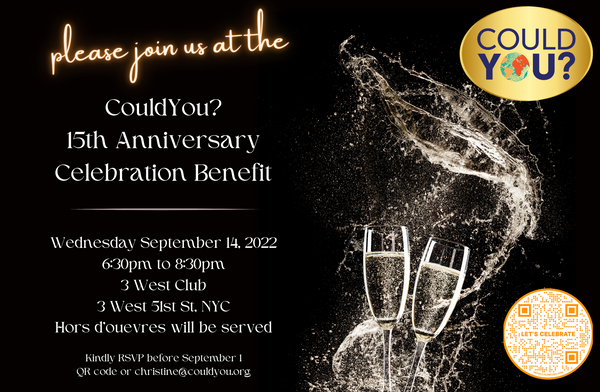NEW YORK—September 8, 2022—On September 14, 2022, CouldYou? is hosting an ambitious symposium addressing period poverty and to explore equitable and sustainable solutions to ensure the needs of all menstruators globally can be met. According to CouldYou?'s founder and executive director, Christine Garde-Denning, "period poverty can end in our lifetime." Period poverty, defined as a lack of menstrual products and menstrual hygiene education, affects an estimated 500-800 million menstruators globally.
"I'm excited for this discussion," Garde-Denning said. "We'll have a room full of interesting, globally-minded, solution-driven individuals meeting to discuss menstrual health and solutions to period poverty," she continued. The goal for the symposium is to bring together people impacted by this issue and call on media, entertainment, and policy-makers to forge next steps towards true menstrual equity.
A key part of that plan for Garde-Denning includes making available options to traditional paper products. "We have a product that is both sustainable and affordable, that can last a menstruator 10 years or more, that eliminates the tough choices many menstruators must make between period products and food, so why is the cup excluded from most state and federal menstrual equity laws? Why is there so little education about sustainable and safer choices menstruators can make for their bodies?" asked Garde-Denning.
The issue is a timely one, as the US finds itself in a continuing tampon shortage. Shortages are just one facet of the problem, the larger issue of which is lack of access due to poverty. Lack of access to period products can adversely affect an individual’s health and well-being. Period poverty exacerbates the vicious cycle of poverty by further marginalizing individuals who menstruate, causing them to withdraw from daily life, forego pay, or miss educational opportunities. To Garde-Denning, who has spent significant time on the ground in Africa working to eradicate period poverty globally, period poverty causes the difficult choice many menstruators make between buying a meal or menstrual products. Worse still are the choices many menstruators are forced to make in order to obtain menstrual products, which can include transactional sex.
Think this issue doesn't affect the US? Think again, saaid Garde-Denning, "In the US alone, one in four menstruators cannot afford menstrual products, one in five miss school during menstruation, and one in ten college students miss classes during menstruation." "When I first began my work in Africa, I heard a proverb that really resonated with me: You cannot build a nation without girls," said Garde-Denning. "Why," she questioned, "are we not doing everything we can to ensure our menstruators have the right to the products they need to stay in school?"
The idea to host the symposium came to Garde-Denning when she began to plan CouldYou?'s 15th anniversary. For 15 years CouldYou? has done significant work in Africa on literacy and malaria and distributing the CouldYou? Cup to meet the needs of menstruators in marginalized communities globally, including distribution of the CouldYou? Cup to Ukrainian refugees. The benefit following the symposium represents CouldYou?'s biggest fundraising push to date, with the goal of raising $1.3 million dollars to clear the waiting list of menstruators waiting for cups. "We must clear the waiting list. We desperately need to scale this initiative," said Garde-Denning.
In New York City to celebrate the 15-year milestone and to meet with African delegates here for the UN General Assembly, Garde-Denning decided to take bold steps toward ending period poverty: "It is time to de-stigmatize menstruation and to bring to the forefront conversations about the correlation between food insecurity and period poverty; the narrow definitions of period products currently included in state and federal legislation; how this issue affects LGBTQIA+ communities; the devastating impact that paper period products have on the environment and our health; and most importantly, the consequences of period poverty on the education of girls globally and in our own US neighborhoods."
Confirmed symposium delegates include representatives from several African nations, Indian delegates, UN dignitaries, social media influencers, medical professionals, public school teachers, girls’ club administrator and girls, corporate CSR reps, members of the media, New York state lawmakers, and other high-profile individuals.
For more information on the symposium and about CouldYou? please contact catherine@allegravita.com.


